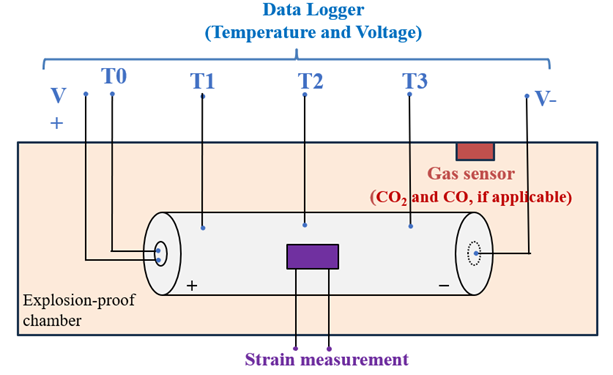CALCE Receives ULRI Research Award for Thermal Runaway Prevention in Batteries
UL Research Institutes (ULRI) is an organization dedicated to advancing safety science and research. Their program on “Protecting Human Health and Safety in the Modern World” aims to bring together leading researchers and experts to address critical safety challenges and develop solutions that can make a real difference in people's lives. By funding promising research projects, ULRI seeks to foster innovation and drive progress in safety science across various domains.
 CALCE has obtained an award from this program for its proposal on “Strain Sensors for Early Detection of Gas Generation for Thermal Runaway Prevention.” The project goal is to provide a practical approach to detect the onset of thermal runaway, even prior to gas venting, in sufficient time to either prevent thermal runaway or, at a minimum, enable mitigation methods to be activated to reduce the impact of thermal runaway in lithium-ion batteries.
CALCE has obtained an award from this program for its proposal on “Strain Sensors for Early Detection of Gas Generation for Thermal Runaway Prevention.” The project goal is to provide a practical approach to detect the onset of thermal runaway, even prior to gas venting, in sufficient time to either prevent thermal runaway or, at a minimum, enable mitigation methods to be activated to reduce the impact of thermal runaway in lithium-ion batteries.
Research Goals and Methodology:
The research project focuses on using strain sensors to detect early signs of thermal runaway in lithium-ion batteries, which occurs when a battery enters an uncontrollable, self-heating state. This project aims to show that strain sensors can identify gas generation before venting, offering a valuable early warning system for preventing thermal runaway. The goal is to develop a cost-effective method to detect the onset of thermal runaway early enough to activate mitigation measures, reducing the risk of fires or explosions.
 Experiments will be conducted on different battery formats and chemistries. The study will evaluate strain sensors like resistive, FBG, and piezoelectric sensors based on precision, cost, ease of integration, and durability in harsh conditions. Controlled experiments will be conducted to induce thermal runaway through external heating and overcharging. During these experiments, strain, voltage, and temperature will be monitored to identify critical thresholds and behavior patterns. A machine learning algorithm will be developed to analyze strain data and identify thermal runaway precursors, distinguishing normal battery behavior from dangerous conditions.
Experiments will be conducted on different battery formats and chemistries. The study will evaluate strain sensors like resistive, FBG, and piezoelectric sensors based on precision, cost, ease of integration, and durability in harsh conditions. Controlled experiments will be conducted to induce thermal runaway through external heating and overcharging. During these experiments, strain, voltage, and temperature will be monitored to identify critical thresholds and behavior patterns. A machine learning algorithm will be developed to analyze strain data and identify thermal runaway precursors, distinguishing normal battery behavior from dangerous conditions.
Strain sensors provide a significant advantage as they can detect gas generation well before venting occurs, offering a wider detection window compared to other methods like voltage, temperature, or gas sensing. This is especially important for high-stakes applications such as military, transportation, and medical settings where safety is critical. The project also aims to evaluate the feasibility of integrating strain sensing systems into battery production, ensuring the solution is reliable, affordable, and effective for various industries. By implementing this approach, the research hopes to enhance public safety and improve the overall reliability of lithium-ion batteries in everyday use.

Thermal Runaway Process and Detection Methodologies
For more information about the event or on research, please contact Prof. Michael G. Pecht.
Prof. Michael Pecht
Director of CALCE
Top
